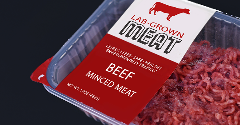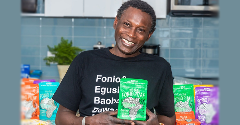News
China announces an agricultural plan that includes cultivated meat
15 Feb 2022China has officially taken a stake in the alternative protein sector, announcing that cultivated meat and ‘future foods’ are sectors in which it will actively participate, according to the country’s recently-released five-year agricultural plan that was reported on by Time Magazine. This is the first time the country has included plant-based protein options as part of its blueprint for future food security.
This announcement caught the attention of alternative protein producers worldwide that are eying China's expansive potential market. Protein consumption in China is staggering. The country consumes 28% of the world's meat, and per capita consumption has tripled since the 1980s, Time reported. Continued demand for animal protein has, however, come up against some significant hurdles recently, including an outbreak of African Swine Fever in 2019 and 2020, which caused domestic pork production to drastically decline in China — a country that consumes half of all the world’s pork.

Despite these difficulties, pork production in China rose in 2021, according to Rabobank. Such reliance on animal agriculture has not benefitted China’s greenhouse gas emissions, which are the largest in the world. According to a report on climate change by the country’s government, livestock was responsible for nearly 29% of agricultural emissions in 2014, the most recent year for which data is available.
However, switching to plant-based meat on a large scale may not be a simple task for the Chinese government. Animal protein has long been associated with health and status in this Asian powerhouse, and taste remains a significant stumbling block. In a LinkedIn post from The Good Food Institute APAC, the advocacy group said, “Deeper investment in product R&D—especially on textural and flavor elements—is needed to develop and scale up products that can appeal to Chinese consumers' famously discerning palates.”
Furthermore, acceptance of cultivated meat is not yet widespread, nor has China’s government officially approved the commercial sale of such proteins. Singapore is currently the only nation where cultivated proteins are sold to the public. Nevertheless, this agricultural blueprint is a sign that this might change, and meanwhile, the general consumption of plant-based options is growing in the country. ADM predicts that the plant-based market in China will reach $14.5 billion in 2025 from under $10 billion in 2018.
Worldwide, the acceptance of alternative proteins is also growing. A report from Boston Consulting Group and Blue Horizon Corporation found that alt-proteins are on a trajectory to represent 11% ($290 billion) of the protein market by 2035, up from 2% in 2020. China is no different.
In its Innovative Protein Industry Outlook report, the country outlined strategies to increase consumption of what it calls “new protein” or “plant meat.” The Good Food Institute indicated that these terms were selected in favor of plant-based meat “to distinguish products from the first-generation ‘vegetarian meats’ that have existed in China for centuries.”
Plant-based protein companies have been on the rise in China. Recently Starfield Foods closed an investment round that was the largest in Chinese history for plant-based meat. But cultivated meat is also beginning to raise funds. Joes Future Food previously raised almost $11 million in a funding round to begin lab-grown pork production.
While this five-year blueprint has yet to be put into action, it is an indication that the world’s largest consumer of animal protein is now considering alternatives. Such a seismic shift in consumption has the potential to create ripples for the rest of the world.
Related news

Israel approves Aleph Farms’ cell-cultured beef in world first
1 Feb 2024
Israel has granted the first regulatory approval for the commercial sale of cultivated beef, joining the US and Singapore in officially recognising cultivated meat’s role towards protein diversification.
Read more
Fazer and Solar Foods launch snack bar made with air protein
30 Jan 2024
Finnish food manufacturer Fazer has teamed up with foodtech startup Solar Foods to launch a limited-edition snack bar in Singapore made using a novel, carbon-fed microbial protein.
Read more
Big brands invest in precision fermentation-derived palm oil
25 Jan 2024
Although still not approved for food applications, big brands such as Unilever and Doehler are investing in precision fermentation-derived palm oil in a bid to reduce the environmental impact associated with this conventional palm oil.
Read more
Supergrain fonio expands its reach in US market
11 Jan 2024
More US consumers will find nutritious, climate-smart grain fonio in supermarkets thanks to a new distribution structure for the import’s most prominent commercial brand, Yolélé.
Read more
Sustainability meets innovation at Fi Europe 2023's Sustainability Ingredients Zone
9 Jan 2024
Fi Europe’s Sustainable Ingredients Zone showcases ingredients forging a path toward a greener future. Three innovators are redefining what sustainability within the food and beverage industry means, with upcycled products, regenerative agriculture, an...
Read more
Supermarkets innovate with private label plant-based ranges
9 Jan 2024
Plant-based product ranges are an important part of retailers’ private label innovation efforts – and represent an important way for supermarkets to reduce their environmental impact.
Read more
The UK prepares to open food security science centre
2 Jan 2024
Amid global food insecurity, the UK government says it is committed to producing crops resilient to climate change and addressing hunger and malnutrition with a food security science centre.
Read more
Novel food safety platform could eliminate animal testing
21 Dec 2023
The European Food Safety Authority (EFSA) has introduced a new platform that has the potential to eliminate animal testing in the food industry.
Read more
Water-conscious consumers, upcycled food, and tech-driven sustainability: Highlights from Fi Europe, part 2
14 Dec 2023
With climate change becoming a tangible reality, consumers’ environmental concerns are changing. At Fi Europe, market analysts revealed how people are now interested in everyday issues like water shortages and tech-driven solutions such as GM drought-r...
Read more
The food industry’s single-use packaging problem
12 Dec 2023
The food industry’s reliance on single-use packaging is a sustainability “sticking point” with viable alternatives not widely available – but new EU rules mean food businesses will remain responsible for the collection and disposal of the packaging the...
Read more